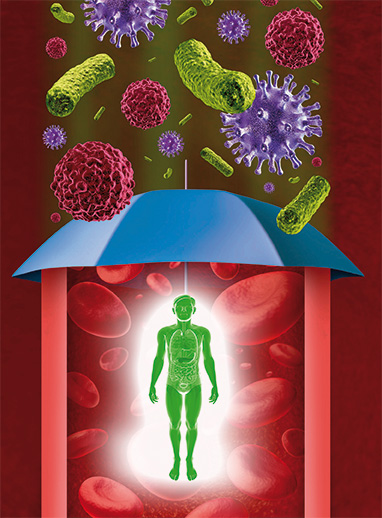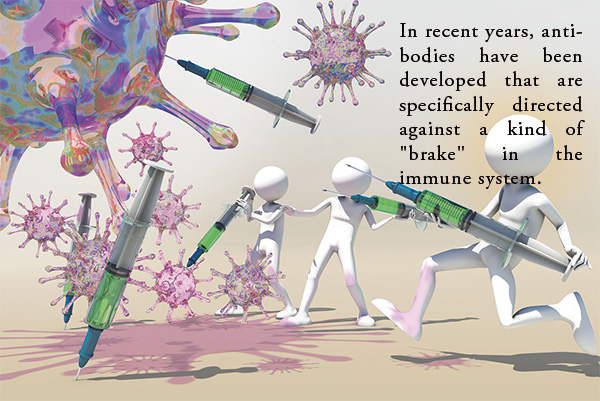Immune Therapy for cancer
What is immunotherapy?
We already presented the first and second parts of this article in magazines number 19 and 20. And now we would like to present the third and final part. When we decided to write about the subject Immune Therapy we didn’t know what we were getting into – didn’t realise how difficult and complicated this subject really is. But now, we are proud to present our results to you and are sure that you will find all three reports valuable reading and learn a lot about the immune system.
Ms Maiss and I are very grateful to Dr Susanne Berthold for her expert, valuable advice.
We repeatedly hear the same question: “Why did I contract cancer, did my immune system malfunction?”
This is not only a question that affected persons ask, doctors and cancer researchers are also studying it.
We know today, that our immune system is not generally powerless against cancer cells. It can recognize and destroy them.
However, tumour cells can develop mechanisms, in order to avoid the defence measures. That’s why boosting our immune system in the normal way is not sufficient to protect ourselves against cancer or to fight it.
Through years of research scientists have come to better understand the interaction between the immune system and the onset of cancer. They are trying to create the missing immune reaction to cancer cells artificially, in the hope that they can slow down the growth of the tumour or even stop it completely through specific immunological therapies. The more we know about the defence mechanisms, the better we can intervene directly against cancer.
Immune therapies are generally only implemented after the classical options like operations, chemo therapy and radiation therapy have failed.
The success of an immune therapy depends on many factors. For example, an immune therapy can lengthen the life of a patient with a metastasized non-small-cell lung cancer by a few months on average.
The survival time of advanced black skin cancer can also very likely be extended by several years. However, only some of those affected respond to immunotherapy, because the same type of cancer also varies from person to person, as each has his/her own cancer.
Which immunotherapies are already recognised and used today?
Immune therapy with cytokines
Cytokines (proteins) are the body's own messenger substances that regulate the activity of the immune system, among other things. Their artificially produced counterparts are not produced for the treatment of specific tumours, but have a general effect on the immune system.
The cytokine interleukin-2, for example, can be used to boost the activity of the immune system. The cytokine interferon in turn slows down the growth and division of cells - this also works with cancer cells.
However, the disadvantage compared to newer methods is that the cytokines do not act in a targeted manner and are only successful in a few tumour types.
Welche Immuntherapien sind schon anerkannt und werden heute schon angewendet?
Immunotherapy with monoclonal antibodies
these are Y-shaped protein molecules that fit exactly to the specific antigens of a cell. They can also be produced artificially and used directly as immune-oncological therapeutics. If they attach themselves to the tumour, this is a signal for the immune system to attack it. They can also be used to specifically send cell toxins or radioactive substances to the cancer cells so that they perish.
There are other application methods in which monoclonal antibodies act as immunotherapy by inhibiting certain signalling pathways that are important for tumour growth.There are also immunotherapeutic antibodies that prevent the formation of blood vessels that supply the tumour. The development of immunotherapy using monoclonal antibodies has already been successful for some types of cancer.
Disadvantage: Immunotherapy with monoclonal antibodies only works with tumours that have very specific surface characteristics that do not or hardly occur in healthy cells. The treatment often fails because not enough antibodies reach the target if the tumours are poorly supplied with blood vessels or are very large.
Immunotherapy with Checkpoint Inhibitors
In recent years, antibodies have been developed that specifically target a kind of "brake" in the immune system: The checkpoints normally prevent an excessive reaction of the immune system against its own healthy cells, so-called autoimmune reactions. Some tumours specifically activate such "immune checkpoints", so that immune cells that could actually recognize and fight the tumour are greatly weakened as a result. So-called immune checkpoint inhibitors or checkpoint inhibitors counteract this: they prevent the suppression of the immune response and thus cause the immune system to attack the tumour more intensively. Several such drugs have now been approved for use in cancer therapy. One example is the antibody ipilimumab, which is used to treat patients with advanced black skin cancer.
Other types of cancer for which there are already approved checkpoint inhibitors include lung cancer, bladder cancer, renal cell cancer and Hodgkin's lymphoma. Some other cancers are expected to follow shortly.
Immuno-checkpoint inhibitors have been approved primarily for the treatment of patients with advanced disease. They only work for some of those affected - but if they do work, it can last a long time. Further checkpoint inhibitors and their effect on other types of cancer are still being investigated in clinical trials.
However, this therapy can also cause side effects similar to the symptoms of autoimmune diseases. These include, for example, inflammation of organs and hormonal glands such as the lungs, intestines, liver, kidneys, thyroid gland and also the pituitary gland and adrenal glands. It can also cause irritation and inflammation of the skin and other organs.

Immunotherapy with therapeutic cancer vaccinations
In contrast to vaccinations that provide preventive protection against cancer, such as HPV vaccination, therapeutic cancer vaccinations with tumour vaccines are intended to act against existing tumours. Different methods are used to teach the immune system to recognise the cancer cells themselves and then fight them. Important are the so-called tumour antigens, which are typical for cancer cells. The immune system is to be applied to such antigens and destroy the cells that carry the tumour characteristics. The vaccine is used to vaccinate either parts of cancer cells or immune cells altered outside the body. These cells are then used to fight the tumour and/or activate further immune cells.
Unfortunately, most of these approaches are experimental and not standard in cancer therapy.
Is there immunotherapy for pancreatic cancer?
A new and promising approach in the treatment of pancreatic cancer is the stimulation of the body's own defence cells by certain messenger substances (cytokines). In small treatment series, sometimes surprising regressions of the tumour or a clear prolongation of life were achieved.
Immunotherapy for pancreatic carcinoma is still in its infancy.
Treatments with immunotherapies should always be discussed in detail with your oncologist or used in clinical studies. For this purpose, the microsatellite instability test should be performed.
Source: www.krebsinformationsdienst.de
Mechthild Maiss / Katharina Stang





